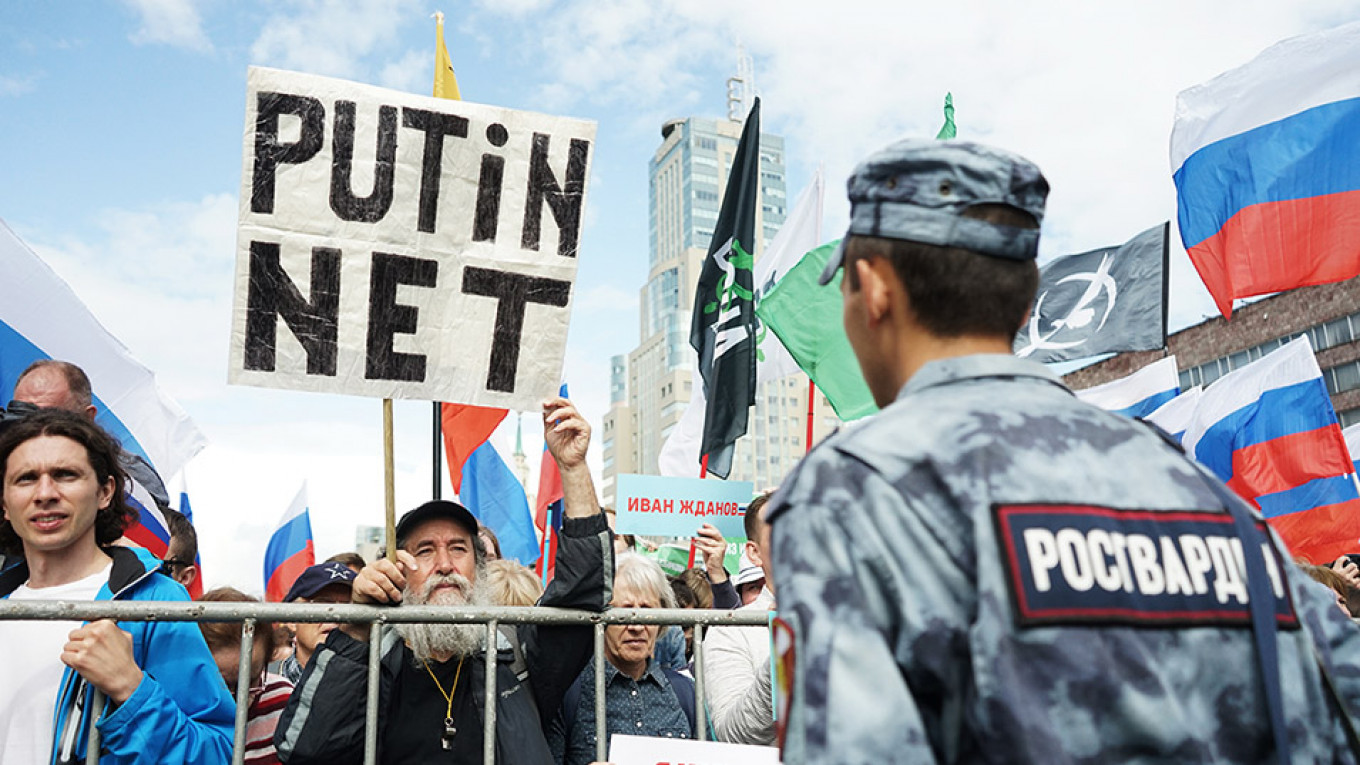A new era began in Moscow this week. And this is no figure of speech.
Russia’s rigid power structure was established not in 2000, when President Vladimir Putin came to power, and not in 2004, when he used the Beslan terrorist attack as an excuse to cancel popular elections for regional governors and begin appointing them personally.
It came about first in Russia's capital city back in the “wild and democratic 90s.” Up until 1993, Moscow had been home to a bustling and noisy parliament, the Moscow city council, founded during the years of perestroika and glasnost.
It consisted of 450 deputies, most of them members of the intelligentsia. They were elected on the wave of openness that accompanied the reforms and, with no prior experience as government officials, many of them were genuinely independent.
They made life difficult for then Moscow Mayor Yury Luzhkov, who wanted free rein over the city’s expensive land, historical buildings and construction budgets without interference from annoying deputies.
When tanks opened fire on the Moscow White House in October 1993, Luzhkov took advantage of the havoc to strike a deal with President Boris Yeltsin and dissolve the bothersome city council.
A new quiet and submissive Moscow City Duma was established in its place.
Now, instead of 450 deputies, just 35 people (later bumped up a bit to today's figure of 45) held elected posts — almost nothing for a city with a population that already numbered 10 million.
That made it easier to ensure that only deputies who would do the Kremlin’s bidding were elected. During the same period, in fact, St. Petersburg’s “democratic” mayor Anatoly Sobchak and his young assistant, a certain Vladimir Putin, pulled off a similar stunt, disbanding the equally rambunctious St. Petersburg city council and its 400 deputies, and replacing it with the far more compact legislative assembly.
The Kremlin-friendly Valentin Gorbunov oversaw the first Moscow city council elections and has headed the Moscow city elections committee ever since. Throughout the intervening 26 years, the parliament of Russia’s capital city has been the most inconspicuous and useless of all the regional legislative assemblies. Muscovites have forgotten what this body does, journalists have forgotten how to get accreditation for it and politicians have forgotten why anyone is elected to it.
Perhaps the only useful thing the City Duma has ever produced is a park near its headquarters. Locals used to like to go jogging there until security guards appeared and forbade the activity. Their only explanation: “It’s off-limits. Don’t ask why!”
It is almost as if the Moscow City Duma had a secret mandate to be as useless as possible to everyone. Ironically enough, one of the campaigners for the park to be reopened for jogging was Konstantin Konovalov. This is the man who designed the Moscow Metro’s new logo and whose leg the police broke when they arrested him while he was out jogging several hours before the start of a protest rally in Moscow on June 27.
The ambiguity and lack of purpose surrounding the Moscow City Duma made it completely uninteresting to voters. And yet, this body approves large and important state budgets.
This summer, however, the authorities themselves managed to reignite Muscovites’ interest in the Moscow City Duma.
At each step, they managed to convince an increasing number of people that these elections mattered. The first step was when the elections commission refused to register independent candidates. The next was when they declared several thousand signatures on voter petitions invalid, saying the people didn’t exist. The final step was when riot police beat peaceful protestors, threw them in jail, and charged them with taking part in public riots.
Every time the authorities acted with greater brutality, it was as if they were urging previously apolitical citizens to become interested in what was happening and sympathize with the opposition.
When the government is so obviously guilty of illegal abuses, even the laziest citizens are moved to action — and going to the polling station to vote is a lot easier and safer than attending a rally where you might get clubbed on the head and sent to jail.
The state involuntarily outdid the opposition in persuading people to go to the polls and vote against pro-government candidates.
Besides the violence and crackdowns, the authorities also launched a propaganda campaign to convince Muscovites to vote for their candidates.
Thirteen years ago, the Kremlin bussed young college students from the regions to a pro-government Moscow rally, equipping them with photos of Putin to wave and bribing them with free pagers and mobile phones.
And eight years ago, the Kremlin corralled public servants and teachers with promises of paid leave and paraded them before television cameras, claiming they outnumbered participants in the genuine anti-government “dissenters’ march” on Bolotnaya Square.
But in the first two cases, the picture was at least reinforced by the election results.
This summer, however, Moscow’s mayor staged free pop concerts on protest days. Television then broadcast the shows with the explanation that most Muscovites are law-abiding.
They also paid the corrupt and odious singer Timati to create a pro-government rap. That failed to improve the situation, but the song did manage to garner a record 1.4 million “dislikes” on YouTube.
Opposition leader Alexei Navalny, for his part, deserves credit for the results in the Moscow elections.
He and his supporters were barred from taking part, so he drew up a list of eligible candidates and called on people to vote for the “bad ones” rather than the “very bad ones.” The authorities launched a propaganda campaign to convince Muscovites to vote for their candidates.
As a result, instead of the three to five council seats that had been allocated for independent candidates, non-Kremlin candidates won in 20 districts. In fact, they could have taken a majority, but Navalny chose the wrong candidate in three cases, and in another the pro-government candidate won by just 26 votes — in part because psychiatric patients were reportedly forcibly taken to the polls to vote.
Navalny’s strategy can be called a success. But Navalny himself and his supporters were not elected: Others won their seats on the city council. Most of those who took to the streets this summer demanding that opposition candidates be allowed to run will not be represented — not to mention the fact that several of them are still behind bars.
Capturing 44% of the seats also cannot truly be called a victory.
This is, first, because pro-government deputies still hold a simple majority, meaning that they can easily make any decision or pass any law they choose.
Second, nobody knows how the “opposition candidates” elected on Navalny’s recommendation will behave.
Their ranks include, for example, a man named Alexander Solovyov who reporters have never even seen. He has exactly the same name as an opposition candidate in that district who was barred from running, and the authorities initially put his “double” on the ballot simply to confused voters.
Even the “fake” Solovyov won more votes than the openly pro-government candidate.
On the one hand, the fact that people would elect a literal unknown shows how deeply opposition sentiment runs. On the other, many of the new deputies wound up on the Moscow city council purely by accident.
The only real victory in politics is when power changes hands. That did not happen in this case, but protestors did achieve a victory of sorts against government propaganda.
Attempts to mislead the public failed, with the result that pro-government candidates lost to even the lackluster opponents who were allowed to run. That is the good news.
The bad news is that when the authorities are able to bar certain candidates from running, arrest protestors and put them in jail, propaganda is not that important.
A Message from The Moscow Times:
Dear readers,
We are facing unprecedented challenges. Russia's Prosecutor General's Office has designated The Moscow Times as an "undesirable" organization, criminalizing our work and putting our staff at risk of prosecution. This follows our earlier unjust labeling as a "foreign agent."
These actions are direct attempts to silence independent journalism in Russia. The authorities claim our work "discredits the decisions of the Russian leadership." We see things differently: we strive to provide accurate, unbiased reporting on Russia.
We, the journalists of The Moscow Times, refuse to be silenced. But to continue our work, we need your help.
Your support, no matter how small, makes a world of difference. If you can, please support us monthly starting from just $2. It's quick to set up, and every contribution makes a significant impact.
By supporting The Moscow Times, you're defending open, independent journalism in the face of repression. Thank you for standing with us.
Remind me later.








